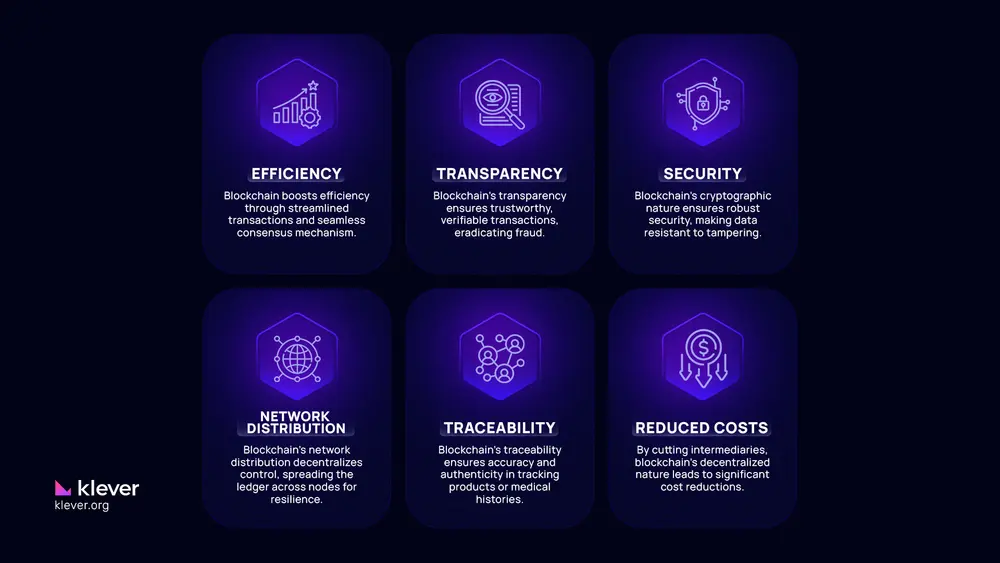
Blockchain technology has emerged as a groundbreaking innovation with the potential to transform various industries. At the heart of this revolution are blockchain applications, also known as decentralized applications (dApps). These applications take advantage of the notable characteristics such as security, transparency and efficiency in building many kinds of solutions using blockchain technology. This article will introduce blockchain applications, explore their impact on different industries, highlight their benefits, and discuss the challenges and future potential they hold.
Table of Contents
Understanding Blockchain Technology

Blockchain technology is a decentralized ledger that records transactions across multiple computers. The system groups transactions into blocks, which link to form a chain. Maintained by a network of nodes, blockchain ensures security and transparency by preventing any single entity from controlling the network, thus reducing fraud risk.
Blockchain technology uses cryptographic methods to secure data and then it makes sure that once a block is added in chain, no one can change the information present. Due to it being immutable, blockchain is perfect for cases where you need the data to be secure from any tampering and honest (real time transactions). Initially created to underpin cryptocurrencies such as Bitcoin, blockchain now supports multiple projects across various industries.
The Rise of Decentralized Applications
Decentralized applications (dApps) are software programs that run on a blockchain network rather than on a single server. Unlike traditional apps, which rely on a centralized authority, dApps operate in a decentralized manner, providing enhanced security, transparency, and user control. While the rise of dApps is most likely fuelled by the increasing adoption of blockchain platforms such as Ethereum, which permits developers to create and deploy smart contracts, along with decentralized applications (dApps) in an easy way.
The Impact of Blockchain Applications on Various Industries

Blockchain applications are having a profound impact on a variety of industries, revolutionizing traditional processes and enabling new business models. Here are a few examples:
Finance: Blockchain applications are transforming the financial sector by enabling decentralized finance (DeFi) platforms. These platforms offer services such as lending, borrowing, and trading without the need for traditional intermediaries like banks. This reduces costs, increases transparency, and provides greater access to financial services for unbanked populations.
Supply Chain Management: Blockchain applications increase supply chain transparency, allowing users to track goods in real-time from production right through to delivery. This lowers the risk of fraud, verifies a products legitimacy and speeds up logistical processes. Walmart and IBM have begun implementing this tech in their supply chain processes.
Healthcare: In healthcare, professionals use blockchain apps to securely update and share patient files. This makes patient data private with access granted by the individual and also maximizes everyone knowing relevant information, all of which is up-to-date, helping improve care quality for patients while lowering overall health.
Real Estate: Blockchain applications seamlessly simplify the real estate deals by processing property transactions including title verifications and contract management. This limits the amount of paperwork, brings down transaction costs and makes realty transactions transparent.
Voting: Blockchain apps offer a secure and transparent way to conduct elections. So, by recording votes on a blockchain, these apps ensure that each vote is counted accurately and cannot be tampered with, increasing trust in the electoral process.
Benefits of Blockchain Applications

Blockchain applications offer several key benefits:
Enhanced Security: The decentralized nature of blockchain and its cryptographic techniques ensure that data is secure and tamper-proof. This makes blockchain apps ideal for applications where data integrity is crucial.
Transparency: Every transaction recorded on a blockchain is visible to all participants, thus providing complete transparency. This builds trust among users and reduces the risk of fraud.
Cost Reduction: By eliminating intermediaries and automating processes, blockchain apps can significantly reduce operational costs. This is particularly beneficial in industries like finance and supply chain management.
Efficiency: Blockchain apps streamline processes by providing real-time updates and reducing the need for manual interventions. This increases efficiency and speeds up transaction times.
Decentralization: Blockchain apps operate without a central authority, giving users more control over their data and reducing the risk of single points of failure.
Challenges and Future Potential

Despite their many benefits, blockchain applications face several challenges:
Scalability: As the number of transactions increases, blockchain networks can become congested, leading to slower transaction times and higher costs. Solutions like sharding and layer 2 protocols are being developed to address this issue.
Regulatory Uncertainty: The regulatory environment for blockchain technology is still evolving. Uncertainty around regulations can hinder the adoption and development of blockchain applications.
Interoperability: Different blockchain networks often operate in isolation, making it difficult for them to communicate and share data. Developing interoperability standards will be crucial for the widespread adoption of blockchain applications.
Energy Consumption: Some blockchain networks, especially those using Proof of Work (PoW) consensus mechanisms, consume large amounts of energy. More energy-efficient consensus mechanisms, such as Proof of Stake (PoS), are being explored as alternatives.
Despite these challenges, the future potential of blockchain apps is immense. As technology continues to evolve and mature, blockchain apps are likely to become more scalable, efficient, and widely adopted. Their ability to provide secure, transparent, and decentralized solutions makes them a powerful tool for innovation across various industries.
Explore Klever Blockchain today and become part of the future of blockchain.
